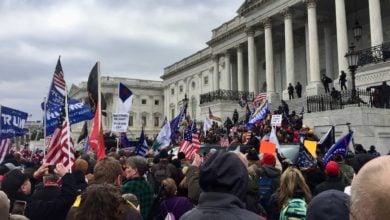California
Governor Jerry Brown has vetoed
SB 104, also known as the Fair
Treatment for Farm Workers Act. Intended
to make unionization easier for farmworkers,
the bill has been at the center of the farmworkers’ struggle in
California. Brown, who has posed as a supporter of the United Farm
Workers union in recent years, has now exposed himself as being on
the side of Big Agribusiness with his veto—an open attack on
farmworkers’ right to unionize.
Brown’s
duplicity exposed
Why
would Brown veto legislation so important to farmworkers after
boasting, during his recent campaign for governor, of the work he
did with César Chávez? Brown even shamelessly used half-a-dozen
photos of himself with Chávez in a Spanish-language ad campaign to
win the Latino vote against his openly racist opponent, Meg Whitman.
In
1975, when he was elected governor the first time, Brown marched with
the UFW and helped
win passage of the landmark Agricultural Labor Relations Act.
Now, as he refuses to meet with representatives of the UFW, the
farmworkers sit outside his office hoping to confront him for his
opportunism.
Brown
explained his actions by stating, “I
am not yet convinced that the far-reaching provisions of this bill .
. . are justified,” despite the fact that he promised he would
address issues affecting the Latino community during his campaign.
His
duplicity could not have been more evident. Brown had the choice of
siding either with the $36 billion-a-year agricultural industry or
with the farmworkers, who work for low wages and remain among the
poorest and most exploited workers. There is no doubt about it—Brown
is nothing more than another servant of the capitalists and their
order.
The
Farm Workers Act
Had
the legislation passed, SB 104
would
have given California’s 400,000 farmworkers an alternative to
traditional, on-the-job polling-place elections to decide on union
representation. Under the new process, farmworkers would have filled
out state-issued ballots in privacy. Bosses are notorious for
threatening farmworkers during union drives. Oftentimes, the threats
successfully defeat the drives.
With
a union, however, farmworkers would have access to better pay and
health insurance. Health care is essential to the workers considering
that they spend long 8-to-12 hour days under the burning sun, often
without breaks, in many cases suffering overexposure, dehydration,
heatstroke and even death.
Maria
Izabel’s death on May 14, 2008, is an example of the harsh
conditions endured by workers in the fields. After working hours
under the hot sun without a break, Izabel collapsed and died three
days later at a local hospital. Had she been part of a union, she
could have had representation along with her other co-workers who
continue to risk death from terrible conditions in the fields.
UFW
President Arturo Rodriguez said: “What never changes is power.
Governor Brown accepted the arguments made by the powerful
agricultural business lobby and rejected the cause of powerless farm
workers.”
Farmworkers
fight
Hundreds
of workers have stood outside Brown’s office since June 16 to
peacefully demand the ratification of SB 104. For 12 days, vigils
were held, but Brown refused to meet with the workers. The day he
vetoed the legislation, thousands of farmworkers descended on
Sacramento from dawn to nightfall. When they learned of Brown’s
decision, the memory of his words during his election campaign left
workers infuriated.
The
farmworkers brought pounds of squeezed orange rinds as a metaphor for
how they felt. In particular, they were spotlighting Brown’s
duplicity, most notably his statement during the governor’s race:
“You don’t just bring in semi-serfs and say, ‘Do the dirty
work, and then we’re finished with you. That’s not right.’”
Ironically, Brown used
farmworkers for the Latino vote, then tossed them aside when he was
finished with them
The
fields need the workers and the workers need the jobs, but without
the support of a union, these workers are bound to suffer the harsh
consequences of unfair treatment from their bosses and managers.
It
is common practice to deny people their basic needs and rights under
capitalism. If it were not for a push forward from people’s
movements, bosses and the state that protects their interests would
continue to deny people even reasonable demands such as the right to
form a union. Unions represent workers in negotiating the conditions
of employment, trying to lower the rate of exploitation, while
corporations and capitalist politicians, Brown included, seek to
maximize profits. The struggle of the farmworkers is not over, and
the Party for Socialism and Liberation will continue to stand with
them until a victory is secured.






